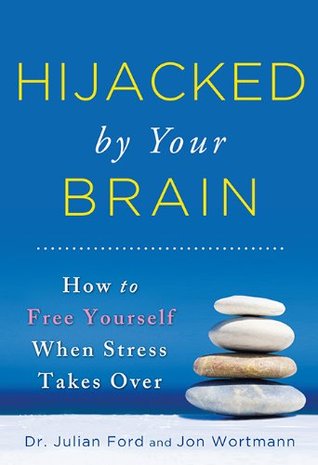More on this book
Kindle Notes & Highlights
Read between
March 13 - May 28, 2019
The key to empowering emotions is remembering that the painful emotion is there to keep you safe. It may not be a happy feeling, but it contains a crucial two-part message: the call to be alert and safe from your alarm, and the offer to reconnect with the feeling of living the life that matters to you.
It’s one thing to know the difference between language that is helpful and intrusive thoughts that make stress worse, and another to be able to find and hold on to helpful ideas when you’re feeling really stressed.
Figuring out what really adds value to your life, what’s really interesting and worth learning, often gets confused with what’s easiest, most pressing, or most entertaining.
Escapist habits, compulsions, and addictions all have a common denominator—they begin as a pleasant way to mask the alarm, and ultimately, they produce even more stress.
We discover our core values throughout our lives by reflecting on the experiences that are most important to us and turning what’s meaningful into the thoughts we live by. They emerge over time.
So alarm signals will almost always shape the first thoughts that come to mind—especially when you’re feeling stressed. But they’re really not fully formed thoughts yet—they’re leftover memories.
You’re running on emotion and memories that fit the feeling of that moment. This explains why we tend to repeat the past. We’re reactively remembering rather than proactively thinking, and thus, not thinking clearly or creatively.
When you activate your thinking center to separate what kind of thought your brain is producing, you raise your level of personal control.
Remember, it’s not what you “do” in the sense of dealing directly with a stressful challenge that optimizes your personal control. It’s what you choose as your guiding thoughts that can give you genuine personal control. When you’re guided by your core values, you may still be feeling a high degree of stress (if your alarm continues to tell you there is a problem or a threat), but you have the certainty of knowing that whatever you choose to do will be a way of not only dealing with stress but also living your core values.
Alarm thoughts not only aren’t bad or a problem, they also aren’t opposed to optimal thoughts. Alarm thoughts are an essential part of optimal thoughts. Alarm thoughts can actually point us toward core values beyond safety and survival, providing insightful evidence about the other core values that we really care about. The alarm fills us with thoughts not only to keep us out of trouble, but also to tell us when what we think does not match what we truly believe.
Your thinking center can always see you through the danger—as long as your thoughts and choices are guided by the core values that empower your thinking center.
The trick to exercising your core values is to clearly define them during periods of reflection when you’re not stressed. This way, when you find yourself in alarm world, your brain has clear categories of thought to draw on instead of thoughts that cause you to cycle back into negative emotions and the unhealthy choices we all can make.
If you’re not feeling positive, the worst thing you can do for your alarm is to try to make yourself think a “positive” thought. At that moment, it just doesn’t ring true to try to think, “I love my life.”
In order to exercise your core values, the thoughts that you focus on have to be framed in terms of what you really care about.
Our goals quickly form out of the pressures and demands of the immediate moment. And that’s the problem: stress causes most of us to put what we really want aside until we alleviate whatever created the stress.
You empower your emotions by paying attention to both alarm and optimal emotions. You exercise your core values by paying attention to alarm thoughts and then focusing on thoughts that reflect what’s most important to you in your life. The “D” in FREEDOM represents the need to determine your optimal goals.
To be centered is to know that what you’re experiencing right now, even if it is uncomfortable, is worth experiencing.
From the perspective of our brains, personal goals define who we are. Our goals are our identity. And when we think and act based upon goals that reflect our core values as well as what we have to deal with due to life’s stresses, we create an identity for ourselves that can withstand any stressor.
Alarm goals don’t guide us toward whom we need to be in our lives, they push us toward what we feel we have to do in order to escape a problem or satisfy an addiction.
In fact, all addictions are the product of an alarm goal that has grown to the point that the alarm takes over our life. The craving or obsession comes to define our identity.
Optimal goals are based upon needs not wants. Most of us want to be a millionaire (or, these days, a billionaire). But we need more than a pile of money. We need security, accomplishment, and fulfillment.
Determining your optimal goals is possible when you do an SOS using a specific question: what do I need that I already have that makes my life complete and worth living?


